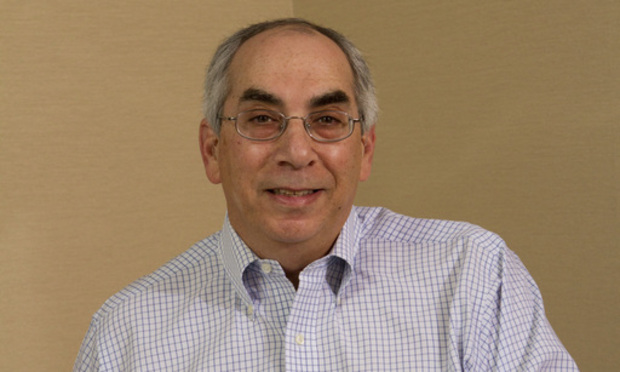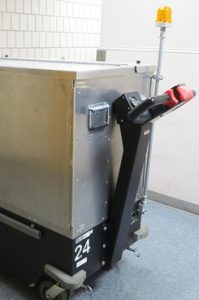Fulton Jury Awards $1.1M to MARTA Security Guard Struck by Fare Cart
The plaintiff's attorney said evidence showed the MARTA employee operating the battery-powered cart had other mishaps the same day, including running into a vending machine and hitting an elevator door.
May 22, 2018 at 12:30 PM
6 minute read

A man struck by a MARTA fare cart while working security at the Lindbergh Station was granted a post-apportioned award of more than $1.1 million for neck and back injuries.
Plaintiffs attorney Keith Fryer said MARTA only offered $50,000 to settle the case during a failed mediation.
“We offered to settle for $350,000 at mediation, but they turned it down,” said the Fryer, Shuster, Lester & Pollack partner.
 Fryer said his case was aided by evidence the MARTA employee operating the cart had other mishaps the same day, including running into a vending machine and hitting an elevator door so hard that it came off its tracks.
Fryer said his case was aided by evidence the MARTA employee operating the cart had other mishaps the same day, including running into a vending machine and hitting an elevator door so hard that it came off its tracks.
Fryer said the fact that the jury assigned 15 percent of the fault to the plaintiff indicated the panel fully considered the evidence and that the verdict will likely withstand any potential appeal.
“I think MARTA's stuck with the $1.1 million, particularly since they apportioned some fault to my guy,” Fryer said.
MARTA staff attorney Vincent Hyman, who defended the case, said via email that MARTA is reviewing the case record.
According to Fryer, court filings and a plaintiff's account, Camal Rashada was 59 and working as a security guard for Norred & Associates in 2015 when he was injured.
As Fryer explained, MARTA uses battery-powered fare carts to transport money, tokens and Breeze cards to and from the token vending machines at its stations. The cart operators—MARTA employees who operate a steering handle and forward and reverse buttons—are accompanied by armed guards as they travel between stations.
The security guards are supposed to get no closer than 5 feet or farther than 15 feet from the cart, he said.
Rashada had moved in front of the cart to press an elevator button when the driver, Jimmy Arnold, struck him in the back.
Rashada felt a burning pain in his back, but he was told to “tough it out” until he and Arnold finished up their route at Lenox Square, Fryer said.
There were no functioning video cameras where Rashada was struck. A camera at Lenox showed Arnold running his cart into an elevator door, and he and Rashada trying to get the door back on its tracks.
“We had video showing this operator steering with one hand while talking on the phone, and another incident earlier the same day when he crashed the cart into a Coke machine,” Fryer said.
“He was apparently having a bad day. My guy said he was usually OK,” Fryer said.
Rashada saw a doctor the next morning and was treated for herniated disks in his back and neck. He continues to get injections for pain and underwent stem cell treatment last year, but “it didn't do anything,” Fryer said.
Rashada never returned to his job with Norred and was unemployed until February, when he signed on with a temp agency as a part-time security guard.
“He sits in a car and walks with a cane,” Fryer said.
Rashada sued MARTA in 2016 in Fulton County Superior Court. Trial began May 14 before Judge Henry Newkirk.
According to the defense portion of the pretrial order, Rashada “failed to pay proper attention and keep a safe distance” from the moving cart. It said he told his treating physician he injured himself while riding a bicycle not long before he was hit by the cart.
It also said Norred denied his workers' compensation claim, and that he and Norred later reached a “no liability settlement agreement in the amount of $50,000, wherein Mr. Rashada admitted that he did not sustain a compensable work-related injury.”
Newkirk refused to allow the jury to hear about that settlement over defense objections, Fryer said. Newkirk also turned down Fryer's request to let jurors know that MARTA fired Arnold from his job as a Mobility bus driver four years earlier but rehired him after a union grievance was upheld.
But the biggest defense problem was that Arnold had earlier said Rashada was walking to the left of Arnold's cart, then crossed in front of him to the right to press the elevator button, Fryer said. MARTA hired an expert to reconstruct the incident, and the button was on the left, not the right.
“On the stand, [Arnold] said 'I guess I was mistaken,'” said Fryer. “I asked him, 'If you had been more attentive do you think you would have hit this guy?' and he said 'No.'”
Fryer said key plaintiff's experts included neurosurgeon Max Steuer of Polaris Spine and Surgery Center, and Atlanta radiologist Darr McKeown.
He also hired forensic reconstructionist Sean Alexander to gauge stopping time and distance for the cart, but Fryer said defense's expert Amber Stern's figures “came out better for us, so I used her. Why pay for my expert to come to court when I can use theirs?”
Other defense experts included video testimony by orthopedist Michael Kalson.
Fryer said Rashada's past medical bills topped $70,000, and his estimated future bills are $181,000. He cited past and future lost wages of almost $148,000.
At closing, he suggested an award of $1.5 million.
MARTA's lawyer did not suggest any number and asked for a defense verdict, Fryer said.
The jury took more than four hours on May 17 to award $1,304,000, apportioning 85 percent to MARTA, for a total award of $1,108,400.
Fryer said the panel included five jurors with master's degrees and several corporate officials, and was “the smartest jury I think I've ever had in Fulton County in 38 years of trying cases there.”
The jurors did not stay around to talk, he said.
This content has been archived. It is available through our partners, LexisNexis® and Bloomberg Law.
To view this content, please continue to their sites.
Not a Lexis Subscriber?
Subscribe Now
Not a Bloomberg Law Subscriber?
Subscribe Now
NOT FOR REPRINT
© 2025 ALM Global, LLC, All Rights Reserved. Request academic re-use from www.copyright.com. All other uses, submit a request to [email protected]. For more information visit Asset & Logo Licensing.
You Might Like
View All

On The Move: Ex-Partner Returns to Lead Nelson Mullins Corporate Group, Burr & Forman Hires University GC as COO
5 minute read
Law Firm Sued for Telemarketing Calls to Customers on Do Not Call Registry

Evidence Explained: Prevailing Attorney Outlines Successful Defense in Inmate Death Case
Trending Stories
- 1New York-Based Skadden Team Joins White & Case Group in Mexico City for Citigroup Demerger
- 2No Two Wildfires Alike: Lawyers Take Different Legal Strategies in California
- 3Poop-Themed Dog Toy OK as Parody, but Still Tarnished Jack Daniel’s Brand, Court Says
- 4Meet the New President of NY's Association of Trial Court Jurists
- 5Lawyers' Phones Are Ringing: What Should Employers Do If ICE Raids Their Business?
Who Got The Work
J. Brugh Lower of Gibbons has entered an appearance for industrial equipment supplier Devco Corporation in a pending trademark infringement lawsuit. The suit, accusing the defendant of selling knock-off Graco products, was filed Dec. 18 in New Jersey District Court by Rivkin Radler on behalf of Graco Inc. and Graco Minnesota. The case, assigned to U.S. District Judge Zahid N. Quraishi, is 3:24-cv-11294, Graco Inc. et al v. Devco Corporation.
Who Got The Work
Rebecca Maller-Stein and Kent A. Yalowitz of Arnold & Porter Kaye Scholer have entered their appearances for Hanaco Venture Capital and its executives, Lior Prosor and David Frankel, in a pending securities lawsuit. The action, filed on Dec. 24 in New York Southern District Court by Zell, Aron & Co. on behalf of Goldeneye Advisors, accuses the defendants of negligently and fraudulently managing the plaintiff's $1 million investment. The case, assigned to U.S. District Judge Vernon S. Broderick, is 1:24-cv-09918, Goldeneye Advisors, LLC v. Hanaco Venture Capital, Ltd. et al.
Who Got The Work
Attorneys from A&O Shearman has stepped in as defense counsel for Toronto-Dominion Bank and other defendants in a pending securities class action. The suit, filed Dec. 11 in New York Southern District Court by Bleichmar Fonti & Auld, accuses the defendants of concealing the bank's 'pervasive' deficiencies in regards to its compliance with the Bank Secrecy Act and the quality of its anti-money laundering controls. The case, assigned to U.S. District Judge Arun Subramanian, is 1:24-cv-09445, Gonzalez v. The Toronto-Dominion Bank et al.
Who Got The Work
Crown Castle International, a Pennsylvania company providing shared communications infrastructure, has turned to Luke D. Wolf of Gordon Rees Scully Mansukhani to fend off a pending breach-of-contract lawsuit. The court action, filed Nov. 25 in Michigan Eastern District Court by Hooper Hathaway PC on behalf of The Town Residences LLC, accuses Crown Castle of failing to transfer approximately $30,000 in utility payments from T-Mobile in breach of a roof-top lease and assignment agreement. The case, assigned to U.S. District Judge Susan K. Declercq, is 2:24-cv-13131, The Town Residences LLC v. T-Mobile US, Inc. et al.
Who Got The Work
Wilfred P. Coronato and Daniel M. Schwartz of McCarter & English have stepped in as defense counsel to Electrolux Home Products Inc. in a pending product liability lawsuit. The court action, filed Nov. 26 in New York Eastern District Court by Poulos Lopiccolo PC and Nagel Rice LLP on behalf of David Stern, alleges that the defendant's refrigerators’ drawers and shelving repeatedly break and fall apart within months after purchase. The case, assigned to U.S. District Judge Joan M. Azrack, is 2:24-cv-08204, Stern v. Electrolux Home Products, Inc.
Featured Firms
Law Offices of Gary Martin Hays & Associates, P.C.
(470) 294-1674
Law Offices of Mark E. Salomone
(857) 444-6468
Smith & Hassler
(713) 739-1250






